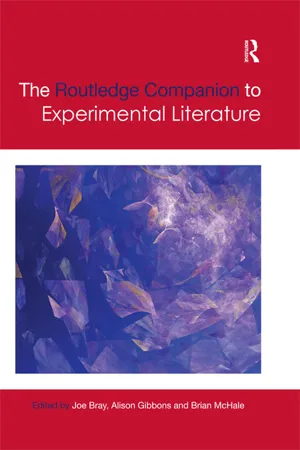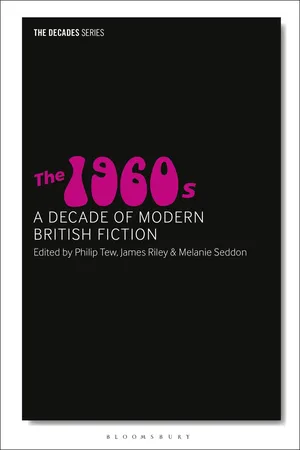Literature
Experimental Fiction
Experimental fiction is a literary genre that pushes the boundaries of traditional storytelling by employing unconventional narrative techniques, structures, and styles. It often challenges readers' expectations and perceptions of fiction, incorporating elements such as non-linear plots, fragmented narratives, and unconventional language use. Experimental fiction aims to explore new ways of storytelling and engage readers in thought-provoking and innovative ways.
Written by Perlego with AI-assistance
Related key terms
1 of 5
3 Key excerpts on "Experimental Fiction"
- Joe Bray, Alison Gibbons, Brian McHale(Authors)
- 2012(Publication Date)
- Routledge(Publisher)
1 Introduction Joe Bray, Alison Gibbons and Brian McHale DOI: 10.4324/9780203116968-1 I What is experimental literature? Experimental literature, as the contents of this Routledge Companion amply testify, is irreducibly diverse. Unfettered improvisation and the rigorous application of rules, accidental composition and hyper-rational design, free invention and obsessively faithful duplication, extreme conceptualism and extreme materiality, multimediality and media-specificity, being “born digital” and being hand-made – all of these, and many others, are ways of being experimental in literature. Despite this diversity, however, a number of common threads (some of which will be explored below) traverse experimental literary practice across the twentieth century and right up to the present. The one feature that all literary experiments share is their commitment to raising fundamental questions about the very nature and being of verbal art itself. What is literature, and what could it be? What are its functions, it limitations, its possibilities? These are the sorts of questions that “mainstream” literature, at all periods – commercial bestseller literature, but also the “classics” once they have been canonized, domesticated and rendered fit for unreflective consumption – is dedicated to repressing. Experimental literature unrepresses these fundamental questions, and in doing so it lays everything open to challenge, reconceptualization and reconfiguration. Experimentation makes alternatives visible and conceivable, and some of these alternatives become the foundations for future developments, whole new ways of writing, some of which eventually filter into the mainstream itself- Joshua Miller(Author)
- 2021(Publication Date)
- Cambridge University Press(Publisher)
4 (2017): 69–91. 17 Zadie Smith, “Two Directions for the Novel,” in Changing My Mind: Occasional Essays (London: Hamish Hamilton, 2009), 71. 18 Marcus, “Why Experimental Fiction,” 41–42. 19 Ibid., 42. 20 Ibid. 21 For a historically sensitive account of the realism–experimentalism dichotomy, see Julia Jordan’s “Late Modernism and the Avant-Garde Renaissance,” in The Cambridge Companion to British Fiction since 1945, edited by David James (New York: Cambridge University Press, 2015), 145–159. Chiming with Marcus’s tech- nically and thematically capacious view of what realism can do, Deak Nabers urges us “to consider what the study of the novel looks like in the absence of such a form,” in order for us “to engage form in its full range of vitality, to approach it as an intellectually and historically vibrant process rather than a taxonomic designator” (“The Forms of Formal Realism: Literary Study and the Life Cycle of the Novel,” in Postmodern | Postwar – and After: Rethinking American Literature, edited by Jason Gladstone, Andrew Hoberek, and Daniel Worden [Iowa City: University of Iowa Press, 2016], 154, 162). See also Jed Esty and Colleen Lye’s introduction to their special issue of Modern Language Quarterly: “Peripheral Realisms Now,” Special Issue, Modern Language Quarterly 73, no. 3 (2012): 269–288. 22 One influential construction of this field is offered by Mark McGurl, via a “typ- ology” of aesthetic reformations in late-twentieth-century fiction, in which he coins the overlapping domains of “techomodernism,” “high cultural pluralism,” and “lower-middle-class modernism” as a categorizations that, respectively, “corres- pond roughly to what is more casually called ‘postmodernism’ . . . ‘ethnic literature’ . . . and ‘modernism’” (The Program Era: Postwar Fiction and the Rise of Creative Writing [Cambridge, MA: Harvard University Press, 2009], 68). 23 Marcus, “Why Experimental Fiction,” 42. 24 Ben Lerner, 10:04 (London: Granta, 2014), 108.- eBook - PDF
The 1960s
A Decade of Modern British Fiction
- Philip Tew, James Riley, Melanie Seddon, Philip Tew, James Riley, Melanie Seddon(Authors)
- 2018(Publication Date)
- Bloomsbury Academic(Publisher)
7 Experimental British Fiction of the Sixties: Five Meta-modern Novelists Philip Tew Writing in The Fourfold Tradition (1961) as the 1960s began, Rayner Heppenstall commented upon the parochialism characterizing many British writers: ‘In this country, there has been a strong reaction against all varieties of interior- monologue, stream-of-consciousness writing’ (157). 1 In such a vein in 1962, William van O’Connor contrasted modernism with newer writing, stating confidently: ‘English fiction in the years since World War II has produced a new kind of protagonist. He is a rather seedy young man and suspicious of all pretentions’ (168). 2 After 1945 the literary establishment trumpeted modernism’s decline. William Cooper dismissed such ‘superannuated art’ (32), declaring ‘We meant to write a different kind of novel from that of the thirties and we saw that the thirties novel, the Experimental Novel, had got to be brushed out of the way [. . .]’ (29). 3 Bernard Bergonzi felt modernism by 1930 ‘had largely exhausted itself, and the possibilities of the realistic novel had been fully exploited’ (20). Alan Sinfield notes ‘the political impetus of British anti-Modernism in the 1950s [. . .]’ (184). 4 In Postwar British Fiction: New Accents and Attitudes (1962) James Gindin claims of the novel between the High Modernists and the fifties ‘the genre lost energy’ (7); in the fifties the Movement rediscovered what James Clements calls ‘an attempted return to realism’ (6). Sinfield indicates this fundamentally Leavisite group ‘acknowledged an allegiance to the Scrutiny school’ (183) generally opposing experimental writing. 5 Such simplistic, fallacious accounts of literary avant-gardism’s decline are misleading, yet were embraced contemporaneously by most scholars in university English departments. In 2007 in ‘Introduction: British Fiction After Modernism’ Lyndsey Stonebridge and Marina MacKay parody such once unquestioned post-war assumptions (1).
Index pages curate the most relevant extracts from our library of academic textbooks. They’ve been created using an in-house natural language model (NLM), each adding context and meaning to key research topics.


